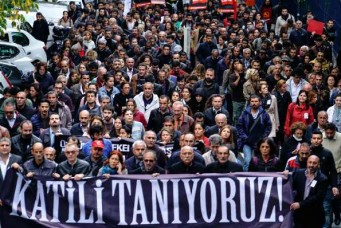Turkey’s Waiting Game On The Syrian Border
After three years of hesitation, Turkey has signaled its readiness to play a more active role in Syria and to join the recently formed coalition against ISIS.

A Turkish soldier patrols the border where thousands of Syrian Kurds have fled from ISIS forces, Kobani, Syria, Sept. 27, 2014. Bryan Denton/Corbis
Vice President Joseph Biden’s clumsy criticism of Turkey last week could not have come at a worse time. By rebuking Ankara for allowing the flow of foreign fighters through its border with Syria, Biden revealed the Obama administration’s lack of strategy when it comes to confronting the ongoing crisis in the Levant. This is further compounded by an incomplete grasp of the facts and the inability to admit the mistakes of the past three years.
Turkey’s waiting game on the Syrian border, just outside Kobani, is cruel from a humanitarian point of view. From a cynical strategic point of view, on the other hand, it is understandable. Any intervention in Kobani places Turkish soldiers squarely in between the Islamic State in Iraq and Syria (ISIS) and a PKK-allied Kurdish force, with which Turkey has had a long history of conflict. After three years of hesitation, Turkey has signaled its readiness to play a more active role in Syria and to join the recently formed coalition against ISIS. Specifically, the Turkish parliament has authorized the use of force by the government, to establish a buffer zone inside Syria and to do so in alliance with international forces that might have to use Turkish soil in pursuit of ISIS.
Turkish forces have been partially mobilized, and their tanks stand ready just outside Kobani. But Turkey would like an intervention in Kobani to be part of an overall strategy approved by the international alliance, something that is not yet forthcoming. Primarily, Turkey wants a humanitarian solution to the continuing flow of refugees across its borders, while keeping them inside Syria, rather than inadvertently keeping them inside Turkey and establishing a long-term Syrian diaspora. Turkey also wants any intervention in Kobani to be a first step toward a more effective intervention inside Syria.
The U.S. is pleased to have Turkey join the coalition, and is ready to at least consider the buffer zone idea. But the congruence of views ends here. Three areas of disagreement are obvious. First, Turkey wants a no-fly zone to protect the buffer zone from Syrian aerial attacks. Second, it also wants the buffer zone to serve as a base for training and equipping the Free Syrian Army (FSA). Third, and perhaps most important, it wants any action against ISIS to be coupled with action to bring down the regime of Syrian President Basha Al-Assad. All three ideas require an active role by the U.S. and NATO.
The Obama administration, rather than hurling unsubstantiated criticisms, should listen to Turkey. The buffer zone is an old idea whose time has come. It would serve not only as a safe haven for Syrian refugees, but also as an on-the-ground base for moderate Syrian rebels, allowing them access to arms and training from the coalition, and an ideal location from which to launch attacks inside Syria. The Turkish-Syrian border, the National Security Council experts should be reminded, is a lot closer to the battlefield than Saudi Arabia, the currently suggested location to arm and train Syrian rebels. The no-fly-zone, at least over the buffer zone itself, is no longer as difficult to install, now that allied planes are already flying over Iraq and Syria in pursuit of ISIS fighters. Whether or not the coalition decides to go after Assad, this would at least serve the humanitarian purpose of preventing his air force from bombing areas where refugees and other civilian populations are concentrated in the north. Finally, attacking the source of the problem, the Assad regime, would complete what so far has been an inadequate strategy.
Vice President Biden, as the only administration senior official with foreign policy expertise, ought to know that what started this whole mess is the Al-Assad killing machine, which let jihadi fighters out of jail so they could wreak havoc upon the secular opposition and the resisting population. The links between the Al-Assad regime and the Al-Qaeda in Iraq fighters who fled Iraq to Syria are all outlined in the administration’s intelligence files—all available to the VP should he wish to refresh his information. To boot, Al-Assad warned publicly, more than two years ago, that if the revolt against him continued the trouble would spread to the entire region. His were not idle threats.
Two other problems present both hurdles and opportunities for U.S. diplomacy: Turkish-Kurdish relations and Turkish-European relations. Turkey has been reluctant to jump into the fray at Kobani because it would involve Turkish troops entering Syrian territory without adequate support from its Western allies and their Arab partners. Such a move would also complicate relations with Kurdish organizations that Ankara has hitherto considered as terrorist groups. It is in the U.S. national interest to encourage closer relations between Turkey and the European Union, to the point of promoting EU membership for a NATO ally that has long desired closer cooperation with Europe. This is a propitious time, given Turkey’s interest and the services it can render on the security front. Arab allies, who may harbor jitters over a return of the Ottoman empire to Arab lands, need to fish or cut bait: They will need boots on the ground to defeat ISIS, and Turkey is the only one that can supply them inside Syria without posing any threat to the region. Kobani is both an urgent humanitarian crisis and a test for the airstrike-only strategy. If Kobani falls it would set back the fight against ISIS and would dramatize the inadequacy of airstrikes.
Nudging along Turkish reconciliation with the Kurds is also an opportunity that should be seized. Turkey is already on better terms with Iraqi Kurds than ever. There are also ongoing talks and partial agreement with Abdallah Oscalan, the jailed PKK leader, which could, with a little help from mutual friends, be pushed into a lasting resolution of the Kurdish question in Turkey. Turkey’s reluctance to engage across its borders, absent an understanding with Kurdish leaders on the future status of the Kurdish areas along its borders, is understandable. Turkey’s stepping in to save Kobani, if done correctly, could help resolve several broader problems. If done clumsily, it could only complicate them.
The Obama administration was slow to recognize the gravity of the problems that would ensue if Syria descended into total chaos, precipitated by the Syrian regime’s war against its own people. Most independent observers, government insiders, and former officials now recognize that fact. While admitting past mistakes does not come easy, fixing them is still advisable and doable. The continuation of this current regime in Syria means the continuation of the regional war that has ensued indefinitely. Empowering the moderate opposition, even at this late stage in the game, is still the only way to bring about a political solution, one that reconstitutes the Syrian government in genuinely representative way. The Turks have been saying this all along, and they are ready to help implement what is at this point an admittedly very difficult proposition. Listen to Turkey, it’s not too late.
Nabeel Khoury is senior fellow for Middle East and National Security at the Chicago Council on Global Affairs and a visiting scholar at the Middle East and North Africa Studies Program at Northwestern University. On Twitter: @khoury_nabeel.




